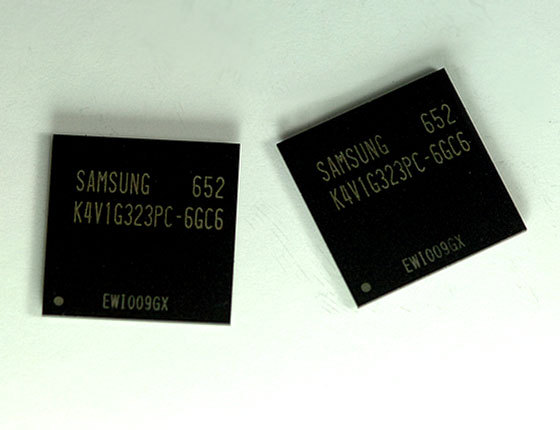Samsung Manufactures First 2 GB LPDDR3 Memory
Samsung confirmed that it is now manufacturing 2 GB versions of LPDDR3 memory modules for smartphones and tablets.
The devices follow a memory standard that was finalized by JEDEC last May and specifically targets connected mobile devices running under 4G networks. While LPDDR3 maintains the power saving features and the signaling interface of LPDDR2, it allows for higher clock speeds, low-power self-refresh, and smart array management.
Samsung's modules are manufactured in 30 nm and run at 1600 MHz, which is 50 percent faster than the preceding memory generation. The maximum data transfer rate is 12.8 GB/s to enable playback of full HD video in real time. Current LPDDR2 modules provide 8.5 GB/s bandwidth.
The introduction of LPDDR3 marks a quick transition from the previous LPDDR2 standard for Samsung. The company began producing its first 2 GB LPDDR2 chips in October of 2011.
First smartphones and tablets integrating LPDDR3 should become available in the second half of next year.
Contact Us for News Tips, Corrections and Feedback
Get Tom's Hardware's best news and in-depth reviews, straight to your inbox.

Wolfgang Gruener is an experienced professional in digital strategy and content, specializing in web strategy, content architecture, user experience, and applying AI in content operations within the insurtech industry. His previous roles include Director, Digital Strategy and Content Experience at American Eagle, Managing Editor at TG Daily, and contributing to publications like Tom's Guide and Tom's Hardware.
-
blazorthon Why doesn't one of the memory companies just buy Rambus? Their mobile XDR from several years ago is better than this much newer LPDDR3 :/Reply -
azraa loopsCan apple have some?I hope they do, of course. Apple is key to the success of companies like Samsung. Cutting the supply line, affects the provider as well.Reply
Now, let's see how Apple manages to introduce changes to their OS and the way it handles the new memory. And on a personal, mean note, I can already see them failing at making real innovation/breakthroughs, like using this. :x -
A Bad Day blazorthonWhy doesn't one of the memory companies just buy Rambus? They're mobile XDR from several years ago is better than this much newer LPDDR3Reply
The problem is that none of the fab companies want to manufacture a rival's product. Rambus sued most or all of the big fab companies over RAM patents. -
blazorthon A Bad DayThe problem is that none of the fab companies want to manufacture a rival's product. Rambus sued most or all of the big fab companies over RAM patents.Reply
Why not just them out and fire all the assholes instead of working with them? I realize that Rambus is effectively one of the most hated companies (for good reason), but that's why I suggested buy them out instead of working with them. -
back_by_demand azraaI hope they do, of course. Apple is key to the success of companies like Samsung. Cutting the supply line, affects the provider as well.Now, let's see how Apple manages to introduce changes to their OS and the way it handles the new memory. And on a personal, mean note, I can already see them failing at making real innovation/breakthroughs, like using this. :xYou realise of course that Apple contracts for Samsung constitute around $5 billion per yearReply
...
If Samsung told Apple to go fish, such as not letting them have the obviously superior screen for the SGS3 for the iPhone, then their R&D and REAL innovation (not the fluffy fake innovation Apple push) then consumers will buy the better product
...
$5 billion a year more in sales and then can wash Apple from their hands and not have to put up with their bullshit anymore -
razor512 While it is great that there is an improvement in RAM, why does that allow for 1080p playback when much slower memory can also handle it? (even a decent system with DDR1 memory can handle 1080p video)Reply -
blazorthon Razor512While it is great that there is an improvement in RAM, why does that allow for 1080p playback when much slower memory can also handle it? (even a decent system with DDR1 memory can handle 1080p video)Reply
A desktop/laptop also generally has over 10GB/s of memory bandwidth between the CPU and the GPU's total memory bandwidth despite using older tech and any that don't usually also can't play 1080p video very well. That this memory is based on DDR3 isn't what lets it mean that the phone/tablet can run full 1080p video in real time excellently, that it has enough bandwidth for that is what matters. -
eddieroolz Never really followed developments of volatile storage for mobiles, but I think after LPDDR3 there won't be much incentive to improve. Smooth 1080p playback is pretty much the apex of development, no?Reply
